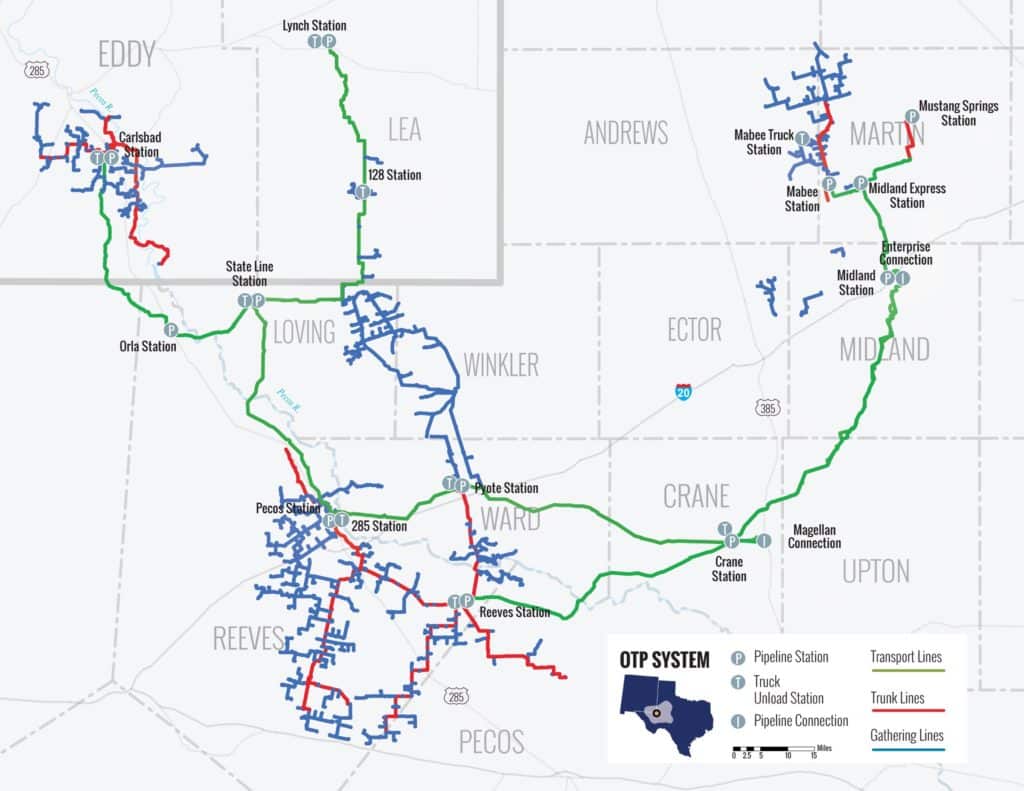In this video, Landowner Condemnation Rights Attorney Philip Hundl talks about the Oryx Midstream Pipeline Project in West Texas. Please call 800-266-4870 or text 979-320-9320 for an appointment with Mr. Hundl. Meetings can be in-person, online or by phone. You can also ask for a no-obligation case evaluation by sending us a form.
Map of the Oryx Midstream Pipeline Project

Summary of the Oryx Midstream Pipeline Project Video
I’m Philip Hundl, an attorney with a law practice focused on land litigation. Primarily I assist landowners facing condemnation proceedings.
From time to time I post videos talking about different condemnation projects around Texas, and there’s a project that I want to bring to your attention.
There’s a company called Oryx Midstream. Oryx Midstream has quite a few small gathering projects out in the Permian Basin. The particular project that I’ve been involved with recently is in Reeves County. The map of Oryx Midstream’s assets is above, but the pipeline project is essentially in Martin County, Midland County, Crane County and Reeves County. Then it moves into Pecos County, Ward County, Winkler County, Loving County and then even into New Mexico.
The Oryx Midstream pipeline activity that I’ve been involved with is in Reeves County. A lot of this is gathering lines for crude oil. These are smaller diameter pipes than we’ve talked a lot about on most other videos. The larger pipelines are 20 inch, 24 inch, 30 inch and even 60 inch diameter lines. Many of the larger diameter lines of 42 inch and the 36 inch are for gas natural gas pipelines. But we’ve had some crude oil projects recently with 30 inch and 20 inch diameter lines.
Small Diameter Pipelines Will Still Damage Your Property
These are smaller gathering lines of four to six inches in diameter. However, even though the pipelines are small, the easement is still going to burden the property it crosses. The easements for the Oryx Midstream Pipeline will be approximately 30 feet.
There’ll be a 30 foot permanent easement and then typically the necessary work space to construct the pipeline is going to be an additional 50 feet. The temporary work space may be 50 feet on one side and maybe 10 feet on the other side of the pipeline easement. I’ve also seen some temporary work spaces just on one side of the of the permanent easement. So once again with the Oryx Midstream Pipeline project’s smaller lines will mean a smaller footprint on the landowners property, but the damage to your property from temporary and permanent easements can still be substantial.
You Need a Lawyer to Help You Negotiate the Easement Agreement
With all these projects you always have to be careful with these easement agreements that are being proposed to landowners. You always have to watch out for what’s being added in the easement agreements that maybe you’re not familiar with or not aware of. These extra burdens on your property might be permanent access roads and temporary access roads on the rest of your property, and not just in the areas of the permanent and temporary easements.
And then also there might be above-ground facilities are being planned by the pipeline company that maybe they haven’t mentioned to the landowner. There’s a catch-all term we’ve mentioned many many times on the videos about above-ground facilities or above-ground appurtenances. And those above-ground appurtenances can mean a lot of different things. So we need to be specific on what those things would be and what they would include.
So with that I just wanted to mention the Oryx Midstream Pipeline and some lateral projects that they have going on at Reeves County, Texas. As with any project if you’re a landowner being faced with condemnation, it’s really important that you understand your rights, and the obligations of the pipeline company that’s seeking to take your land or take an easement from your land through condemnation. Being familiar with the process and having a lawyer who understands and can explain the condemnation process is extremely important.
Get a No-Obligation Case Evaluation
Call 800-266-4870 or text 979-320-9320, or send us the Case Evaluation form.
Call 800-266-4870 or text 979-320-9320 for an appointment. We can also arrange for online and telephone appointments all over Texas.